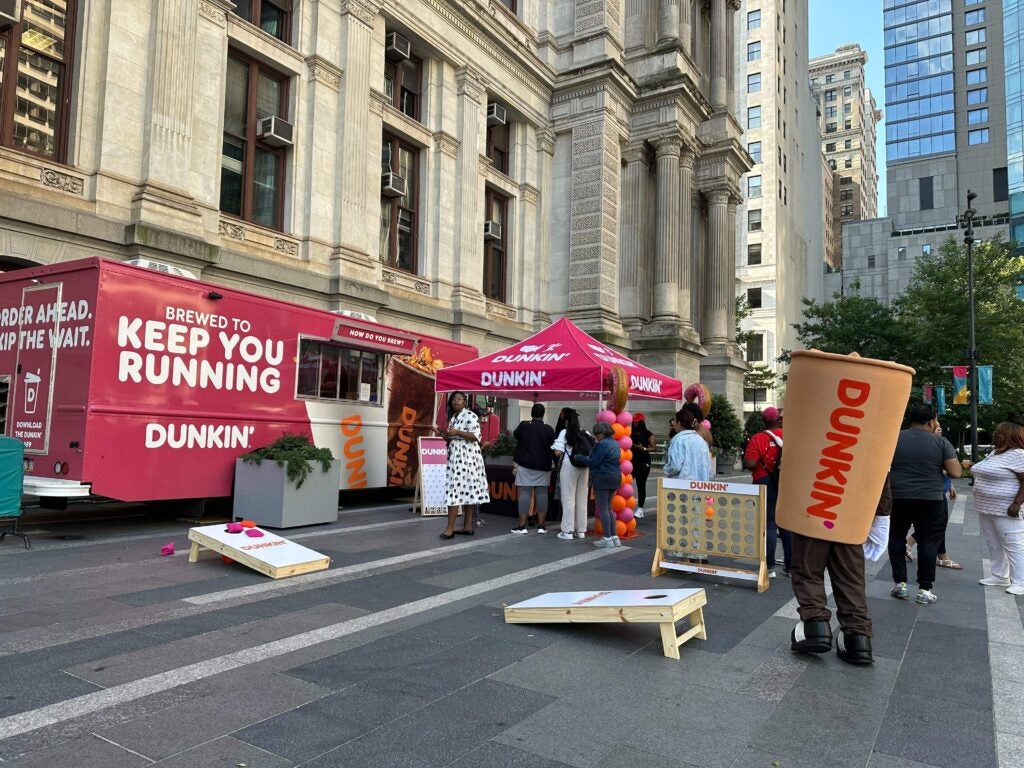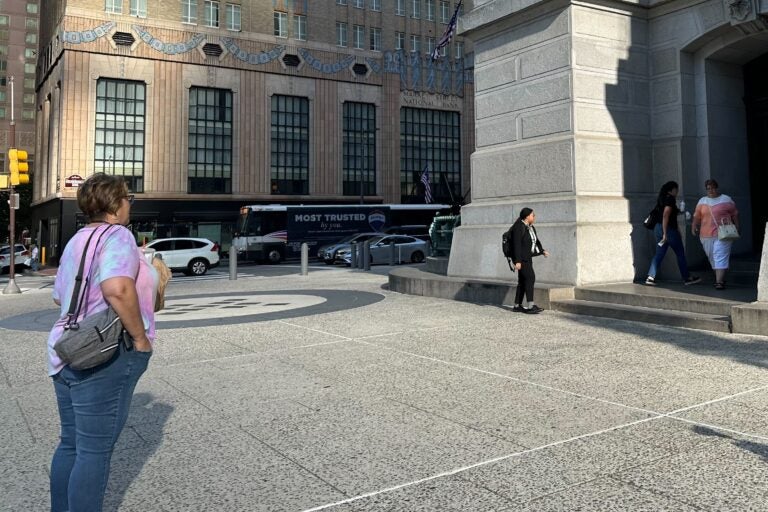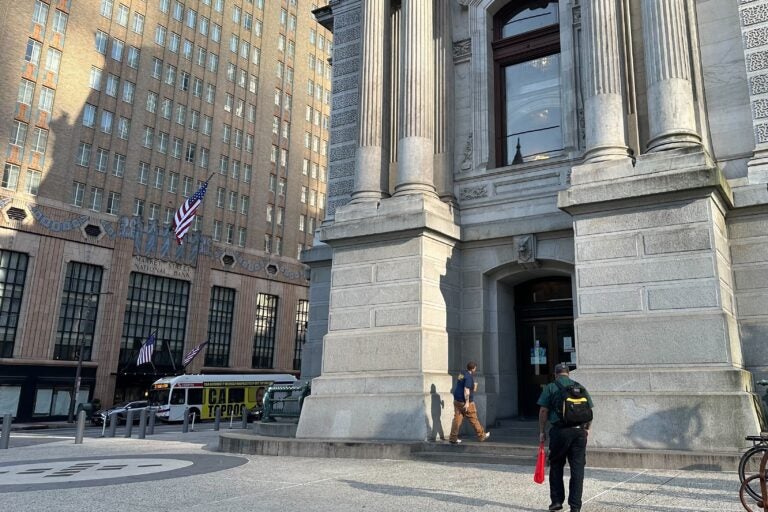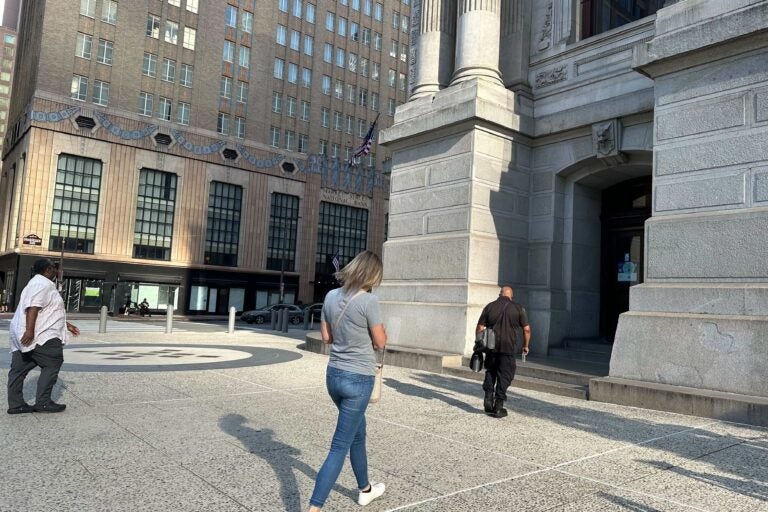Philly city workers say ‘everyone is pissed’ as Parker’s return-to-office mandate reveals lack of space, resources
When Philadelphia city employees showed up in person last week, the situation was chaotic and without enough office space to do their jobs.
Listen 1:03
Mayor Cherelle Parker speaks at Philadelphia International Airport, Feb. 16, 2024, in Philadelphia. (AP Photo/Matt Rourke, File)
From Philly and the Pa. suburbs to South Jersey and Delaware, what would you like WHYY News to cover? Let us know!
City employees described the first week when all 26,000 workers were mandated to return to the office full-time as chaotic and miserable. “Everybody was pissed,” they told WHYY News.
Mayor Cherelle Parker announced May 20 that everyone would be required to work in person across city buildings — mostly in Center City — starting July 15.
The Parker administration won a legal challenge by the American Federation of State, County and Municipal Employees (AFSCME), which represents about 3,700 administrative, professional and technical assistance employees working for the city of Philadelphia on July 12.
Dozens of Philadelphia workers streamed in and out of the employee entrance of City Hall on Friday morning despite a global cybersecurity issue with a Microsoft update. City courts were closed, jurors were sent home and confused attorneys showed up for trials. City officials told WHYY News that all workers still reported to their office in person Friday.
WHYY News is using pseudonyms for independently confirmed city employees who shared their experiences because they fear being fired or other retaliation for speaking up after the mandate went into effect.
On Monday morning, Lewis said his regular Regional Rail train was jam-packed and he left home an hour earlier than usual.
Instead of using the city’s desk hoteling system, where hybrid workers shared desks on different days of the week, he was assigned to a cramped conference room in City Hall.
There were six electrical outlets along the walls, far away from where workers were expected to sit. And nine people from different teams were assigned to the room.
When Lewis arrived, there were no places to plug in his laptop, so he ended up working on a couch hunched over his computer for hours. For his role, he typically uses at least one computer monitor, which was not available in the office.
Everyone was still juggling virtual meetings throughout the day, which Lewis said was chaotic.
“Now we’re sitting nine [people] to a meeting room. People are just trying to work and you have to take a meeting. You don’t even have a cubicle. Everyone is pissed off,” Lewis said.
Some higher-level employees at least had private rooms that were cleaned out storage closets but were working on storage cabinets instead of desks, he said.
“One thing that bothered me is that they were preaching about accessibility, but this mandate ruins things for a lot of people that may have disabilities [and need to work remotely],” he said. “This entire thing is kind of a slap in the face to workers.”
The work environment changes have altered the dynamic on his team, too. It wasn’t unusual with remote work for salaried employees on his team to hop on after traditional work hours to handle anything the department needed to function. But now, there’s zero interest in working a second longer than required.
“Now because of the mandate it doesn’t feel like anybody wants to do anything unless they’re in the office, which has been a little weird to adjust to,” he said.
The Parker administration gave away French fries from Chickie’s and Pete’s in front of City Hall on Monday, something that many workers said was insulting — not only because there weren’t enough for everyone, but that it also felt trivial.
When Lewis swung by the Fashion District for a swag bag, he found some pieces of candy inside.
Overall, he said the work experience wasn’t worth the commute. And it definitely wasn’t worth the financial hole he’s in after relocating to Philadelphia months sooner than he anticipated.
Lewis said he moved halfway across the state to take this job about six months ago.
Now he’s looking for a new one.
That’s also the plan for El, who said she was poached from another employer for her job with the city.
She said that the administration’s rhetoric about equity was “absurd to the brink of fictitious,” saying that in-person work increases sexual harassment, sexism and racism in the workplace.
“I think the best path forward is to stop picking fights with your own employees and to stop infantilizing them,” she said. “I don’t want to continue to work for someone who seems to think that I’m an idiot. I’ve worked too hard in my life to get to the place where I’m at.”
When she arrived to work at another Center City building, there was at least a dedicated desk for her but no Wi-Fi internet — which has been the case for months, so she plugged her computer into the ethernet port.
But not everyone is so lucky; there are not enough internet ports for everyone who is sharing a desk in the building.
“It would be survival of the fittest for whoever gets to work first to plug into the port and the other person’s just going to have to sit there. It’s not as simple as splicing it [ourselves], you’d need the IT department to have to come in and split a bunch of ports,” she said.
There are even more workers in the office than usual because the city is hosting dozens of paid interns over the summer, which can add five extra people for each division.
El is on contract with the city, so she doesn’t qualify for benefits like SEPTA passes, which is the situation for thousands of other contractors.
These changes are prompting her and her coworkers to quit once they find new jobs.
She’s frustrated with the assertion that city employees were on the couch for the past few years when many were in the field and working long days during the height of the COVID-19 pandemic.
“Nobody would quit the city because they’re lazy. They’re quitting a job they love because it’s unsustainable,” she said. “The system execution of this [mandate] is chaotic.”
City employees are asking their department leaders a slew of questions with few answers, according to an internal town hall recording held by one department this week and shared with WHYY News.
While the Parker administration’s mandate is in effect, there are no written policies on the department level yet about what the rules are beyond five days of in-person work a week.
The department leader told employees that there would be some flexibility about work outside of the traditional office setting because some of the workers are already in the community for their jobs.
They said they don’t expect workers to sit on the floor or in hallways if there aren’t enough desks at the office, but did not provide information about what to do in the meantime if there weren’t enough workspaces other than communication with their managers.
Some workers complained about hostile work environments with coworkers who treat them poorly despite diversity training, expensive commutes, increased stress and feeling unappreciated by the public and their leadership.
One local business professor studied the relationships between coworkers and also between employees and their employers before and during the COVID-19 pandemic.
And the way the leadership of any employer communicates changes to the work environment matters, said Kyoung Yong Kim, an associate professor at the Villanova School of Business who studied social distancing and workplace relationships in both the U.S. and South Korea.
In general, he found colleagues with negative relationships worked together better when remote, and that good relationships between coworkers were unaffected with remote work.
“When an organization implements social distancing initiatives, employees interpret the rationale and the reason behind such initiatives,” Kim said. “Depending on their interpretation, employees react differently.”
For example, when employers sent workers home during the COVID-19 pandemic, many workers interpreted that to mean that businesses cared about their well-being. And, in turn, workers are more loyal to the organization, he said.
“Such as helping coworkers and making suggestions that might help the organization,” he said.
But when employees feel that workplace changes, such as remote to in-person work, are only to help the management and not the workers, their reaction is different.
“It’s not just what an organization does that matters … but how employees interpret that is critical,” he said.
After criticism from workers about offering French fries during a heat wave, the city gave away free water ice later in the week. The Center City District hosted a free Dunkin’ Donuts drink sample truck for city workers on Friday morning.

For the first time in years, Robert commuted on the train for more than an hour five days in a row into Center City.
He was working a hybrid work schedule, two days in the office and three days remote after the COVID-19 pandemic began four years ago, though his office was one of the last to allow remote work.
When he was working from home, he was able to spend more time with his young children.
“I was able to hang out with them during my 30-minute lunch,” he said.
When he told one of his daughters that their lunch time wouldn’t happen anymore this fall, she wept, he said.
“It makes my life worse and it feels cruel for no reason. Like I’m being punished and my leadership doesn’t care about me,” he said. “Every department is short-staffed, the volume of work is high, morale is already low to begin with … everyone is miserable.”
Robert said he’s frustrated because there’s no difference to the type of work he does whether it’s at home or in the office.
But he feels stuck because he can’t afford to take a pay cut or have a gap in health care benefits because of his family. So he’s on the hunt for a new job, but it might take a while.
“I’m not in a position in my life that I can just leave right now and go somewhere else, but I wish I was because I’m not happy here,” he said.

Get daily updates from WHYY News!
WHYY is your source for fact-based, in-depth journalism and information. As a nonprofit organization, we rely on financial support from readers like you. Please give today.









